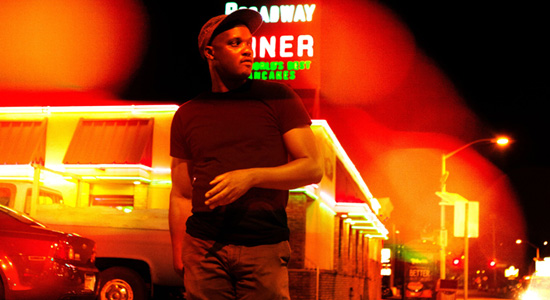
Son Little sings the first thing that comes to mind—or else
Aaron Livingston has done a lot of good work since leaving L.A. and heading to the Philadelphia/Trenton area, where he’s resided since 2010. There’s the (surely one-day, legendary) collaborations with synth-and-sample composer RJD2 on the producer’s The Colossus album, as well as the Philly pair’s own band Icebird (which resulted in the rocky The Abandoned Lullaby) and the sing-songy guest spots he executed on the Roots’ radical 2011 Undun.
“I definitely think that listeners can connect the dots between what I did there, on someone else’s records, and what I’m now doing,” says Livingston. “I know that I can. I think I’m like a musical librarian in that regard, absorbing lots of knowledge.”
The “now” that Livingston speaks of comes under the rubric of a new name and vision: the sparsely atmospheric blues, R&B and dancehall—all tinged with hip hop—that is Son Little and his eponymous debut full-length.
At first, Livingston points toward an expansion of his knowledge, a packed library that has recently included books such as Dave Tompkins’ How To Wreck A Nice Beach, writer/ director Alex Proyas’ film Dark City and musicians such as Mumford & Sons and the Maccabees. Mainly, what the singer and songwriter believes is the biggest di fferences between Little and Livingston is that he is now directing and producing his own stu ff completely.
“It’s really about letting go, and that process has taken me to places that the stuff with Jon (Krohn, a.k.a. RJD2) couldn’t go,” he says. “Not because of anything bad. Jon’s great and I’m totally proud of what we did. It was a shared vision, though—his vision. The vision and range is di fferent now; the emphasis, too, because it’s all mine.”
Livingston laughs and says something about having his own cues, his own “lingo”: “I think that’s what Son Little is.”
A large part of coming to Little—which Livingston did in 2013, before signing with Anti- in 2014 and dropping a six-song EP, Things I Forgot—meant eschewing all of what came before Little. He made that immediate past a thing to forget, as he suddenly had a notion to just throw everything out about himself—just get rid of it.
“Yeah, I erased everything,” Livingston says of 2013’s circumstances. “I had actually started working on an album. It was nearly there, but something wasn’t right. I got frustrated. I wanted something else. So, I threw it out, started everything over. It felt really good, too. [Laughs] So, when I started it all over, I wanted everything fresh—a new name especially. Nothing lingering. All instinct.”
That was the elemental idea that Livingston/Little let develop with no rules aside from where the immediate took him. Where it took him most of the time was the moody blues mash with R&B, reggae and hip-hop contours that is the stomp-and-start of “Carbon,” the textured, synth-phonia of “Go Blue Blood Red” and the low country-ish “Doctor’s In.”
“There was an intensity that built around that name Little and the songs that came from it,” says Livingston. “It started with the name and a noise, and I let it become something. If I didn’t like it, I didn’t rework it. I just started over. Make it all fresh—why not? I had never experienced that before.”
—A.D. Amorosi






